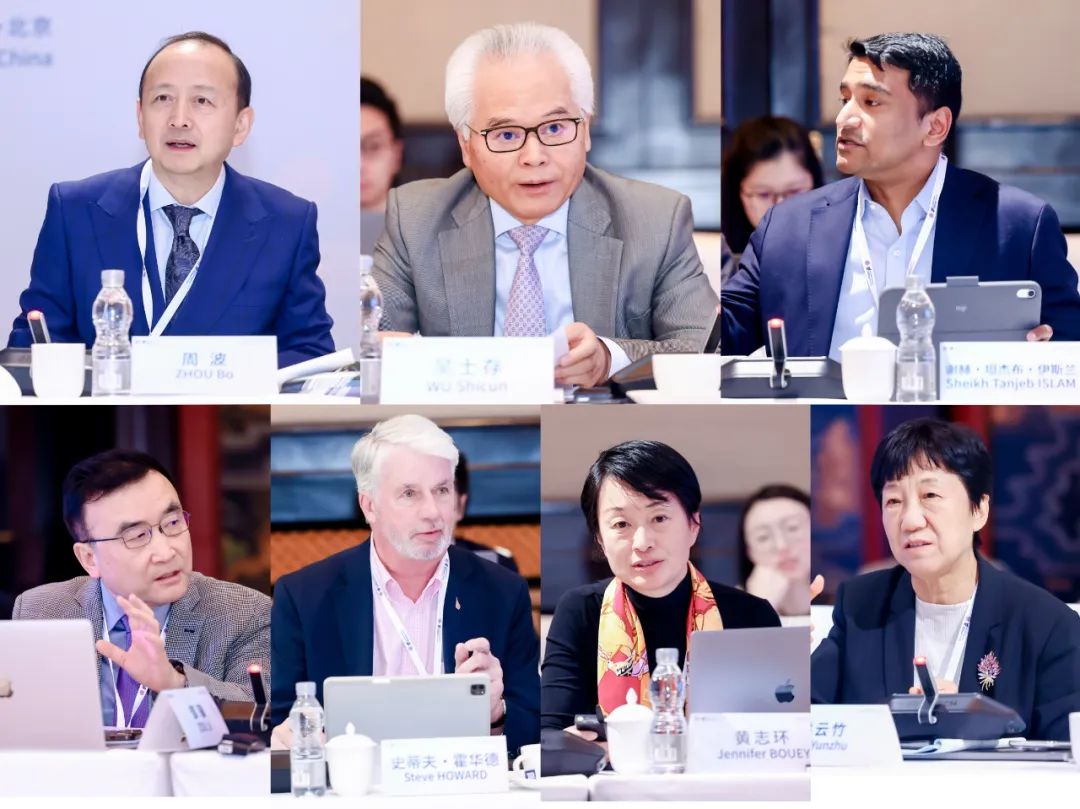
China’s role in global sustainable development encouraged during Secretary General visit to Beijing, March 2025
China’s emerging role as a major contributor to global sustainable development has been further encouraged after Foundation Secretary General, Steve Howard’s, recent visit to Beijing, in March 2025.
Mr Howard travelled to the Chinese capital to advance China’s contribution to the Foundation’s ongoing Global Project, ‘Shaping Global Governance, Climate and Nature.’
He addressed the 7th International Security and Strategy Forum convened by Tsinghua University’s Center for International Security and Strategy (CISS), proposing China’s further contributions on sustainable development, including practical action to address climate change.
Mr Howard’s remarks may be read in full below, along with the program of the CISS Forum.
Cooperation between Australia and China on the global energy transition was also a key focus in Mr Howard’s meetings with senior representatives of government, universities and think tanks, including:
- The Chinese Ministry of Commerce
- The Ambassador of Australia to China, His Excellency Scott Dewar
- The Energy Foundation China
- The Institute for Climate Change
- China Foreign Affairs University.
While in Beijing, Mr Howard was interviewed by The Global Times, a significant Chinese newspaper. He discussed Australia-China relations in today’s changing geopolitical environment, emphasising that Australia’s economic security is tied to China, its biggest trading partner. A transcript of the interview is available below.
Related Links
Remarks to 7th International Secruity and Strategy Forum – Full Text
Did you hear the silence? ‘The silent revolution’, as I like to call it.
I heard it, on arrival in Beijing, where the future is here and now.
China’s electrification strategy, most apparent in electric vehicles everywhere and the underlying systems that make them possible, is a game-changer, in terms of win-win: save the planet and grow economic opportunity through transformation.
What does this have to do with the topic I have been asked to address?
Lots, as it turns out. Let me explain.
The international system, the so-called ‘rules-based order’ that has been largely Western in its construction and operation for the past 80 years, is now officially broken. The multipolar world, still messy and fuzzy, is suddenly and awkwardly landing.
This is a moment in time when humanity, in its various forms of organisation, is faced with some critical choices. As Pope Francis has said, it feels like we are living not so much in the end of an era but in a change of epoch.
But what sort of multipolar world do we want? Do we want a world that is sustainable, that is fair and inclusive, that unites rather than divides, at least on some key issues?
If so, there are fresh choices to be made about how best to organise the most effective forms of co-operation across all sorts of borders, real and virtual, amongst those who see benefit in so doing.
I speak not only of nation states, but of all levels and types of government, of enterprise, academia, institutions, communities and individual citizens. All, in one way or another, have agency to effect change, just as they will be impacted by change that is imposed on them.
Science has long demonstrated that climate change is an existential threat to humanity. The impacts of climate change are cumulative as they are universal; they threaten us sooner rather than later and they do not respect national borders.
Some useful progress has been made in building global agreements to address climate change, although implementation is less than satisfactory, particularly in enabling adequate private as well as public investments and other forms of support for the transition that is required in the global South.
On climate change and related matters that affect the global commons, such as the preservation of nature and bio-diversity, we need to activate new methods of collaboration, consistent with and hopefully strengthening existing official processes.
Call this a ‘ground-up’ approach, if you like, involving ‘coalitions of the willing’, or ‘multi-party agreements’, that are inclusive and open-ended. By multi-party, I mean bringing to bear many sectors of society: the public and private sectors, in which the private sector, as investors and operators of business, is willing to play a much more significant role, in the design of frameworks as well as in the implementation of actions.
This is the work in progress of my organisation, a Global Project we launched just under a year ago in Rome, a rolling project which already has many affiliated enterprises, institutions, civil society and governments, who are working together, in seeking common ground and in configuring collaboration, where possible.
We’ve just concluded a series of worldwide consultations that reinforced our belief that there is more to gain in working together than apart, in staying the course on the global energy transition.
Our network, of ‘leaders with purpose’, is designed for the new multipolar epoch. It knows no boundaries, generating engagement and involvement from all over the world.
One example is Brazil, where we will meet in the Amazon in August, to lend our support to the ambition of President Lula for the world to do more to help preserve the future of the Amazon.
Returning to where I began, to the remarkable electrification of China and its dual win-win outcomes, of helping to save the planet, while at the same time generating future economic prosperity, I would like to propose a new multi-party initiative, to build outwards on China’s leading role.
I’m not referring specifically to the export of Chinese electric vehicles – they will probably look after themselves, various tariffs notwithstanding. Rather, I refer to the systems that underpin their ability to operate, the electrical generation, transmission and distribution strategies, as well as the shared internationalisation of electrification standards that China would like others to adopt.
In all of this, I imagine an inclusive and open-ended approach by like-minded actors, with an escalation of existing efforts. For example, we have already initiated conversations between my home country, Australia and China, for the joint decarbonisation of resources such as iron ore, vital for both nation’s future prosperity.
Now, as a further step, governments and enterprises of both nations could choose to work together and with others who are willing to collaborate, in creating new arrangements to facilitate the international electrification of economies, around common or agreed standards.
Standing still is not an option. There’s a saying, ‘if you stand in the middle of the road you are bound to get run over’ – in this instance, by a silent, efficient, electric vehicle.
Let’s get on with it, let’s choose hope over despair, cooperation over conflict, action over reaction. Thank you.
